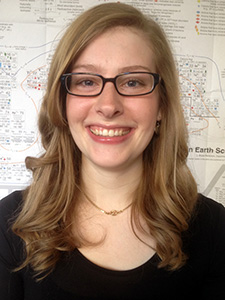JODY WYCECH
University of Wisconsin – Madison
Evaluating the impact of Central American Seaway closure on Pliocene Walker circulation
Abstract
Closure of the Central American Seaway (CAS) during the Pliocene reorganized patterns of ocean circulation, but its impact on atmospheric water vapor transport is unclear. I propose to investigate the strength of equatorial atmospheric (Walker) circulation during the Pliocene by reconstructing zonal (E-W) gradients in sea-surface salinity. This will be achieved by pairing in situ δ18O and Mg/Ca analyses of biogenic calcite domains within planktic foraminifera from three equatorial Ocean Drilling Program (ODP) sites. The use of these in situ data will greatly enhance the fidelity of resulting zonal gradients in Pliocene sea-surface temperature and oxygen isotope composition of seawater (δ18Osw).
Biography
As an undergraduate chemistry major, my research on antibiotic contamination in groundwater motivated me to pursue graduate research in a discipline that utilized both chemistry and geology. My interest in paleoclimatology was piqued completing organic geochemistry summer research at the University of Texas at Austin. Now at the University of Wisconsin-Madison, my Ph.D. research investigates the geochemical effects of diagenesis on planktic foraminiferal shells. I utilize in situ techniques to measure stable isotopes and trace elemental ratios within individual foraminiferal shells to reconstruct diagenetically-unaltered paleoclimate records. The Schlanger fellowship provides me with the opportunity to apply these novel geochemical methods to investigate the strength of Walker circulation during the Pliocene.







